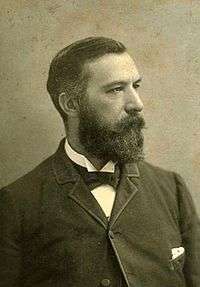Needham B. Broughton

Needham Bryant Broughton (1848–1914) was a wealthy businessman and Democratic politician in Raleigh, North Carolina in the 19th and early 20th centuries. He owned a prosperous printing business. Broughton was a large contributor to and supporter of education. Needham B. Broughton High School was named in his honor.
Biography
Needham B. Broughton was born on February 14, 1848 near Auburn, North Carolina. His parents were Joseph Broughton and Mary Bagwell, the former of whom died in 1854.[1]
In 1856, Broughton came to Raleigh, North Carolina and studied in public schools for three years. Afterwards he was hired as an apprentice to John W. Syme, an attorney for The Raleigh Register, a position he held until 1864. With the end of the Civil War he moved to Washington, D. C. and worked on the Congressional Globe. Later, he went to New York City and set type for the New York Herald. In 1872, Broughton returned to Raleigh and established the Edwards & Broughton Printing Company with C. B. Edwards.[1]
In the late 1880's, Needham B. Broughton lead a successful lobbying campaign in the North Carolina General Assembly to secure funding for an 8-month public school.[2]
Broughton served on the state Board of Agriculture in the 1890s[3] and as a state senator[4] from 1901-1902.[5] Broughton was also a key supporter of Prohibition and was elected president of the North Carolina Anti-Saloon League in 1902.[6] He was active in the Baptist church, and served as a trustee of Wake Forest College and of Meredith College.
Broughton was buried in the Historic Oakwood Cemetery of downtown Raleigh.
Legacy
C. B. Edwards sent a letter to the Raleigh Public School board, requesting that a new high school in Raleigh be named for Broughton in honor of his service to public education in the city. The dedication ceremony for Needham B. Broughton High School took place in 1930 towards the end of the school year.[2]
See also
References
- 1 2 Amis, Moses Neal (1913). Historical Raleigh: With Sketches of Wake County (from 1771) and Its Important Towns; Descriptive, Biographical, Educational, Industrial, Religious. Raleigh, North Carolina: Commercial Printing Company. pp. 180–183.
- 1 2 Barbee, Jennie M (1943). Historical sketches of the Raleigh Public Schools, 1876-1941-1942. Raleigh, North Carolina: Barbee Pupils' Association. p. 67.
- ↑ North Carolina and Its Resources
- ↑ Haley, John H. (1987). Charles N. Hunter and Race Relations in North Carolina. UNC Press. p. 132. ISBN 978-0-8078-5061-9.
- ↑ NC Manual of 1913
- ↑ Johnson, K. Todd (2009). Historic Wake County (illustrated ed.). HPN Books. p. 42. ISBN 9781935377108.